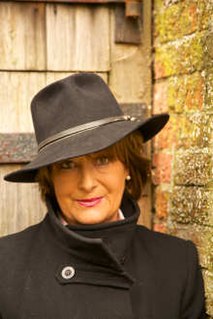A Quote by Jeff Jarvis
Just heard the best word in the English language: benign. (And I don't need to see that doctor again for five years.)
Related Quotes
I have a funny relationship to language. When I came to California when I was three I spoke Urdu fluently and I didn't speak a word of English. Within a few months I lost all my Urdu and spoke only English and then I learned Urdu all over again when I was nine. Urdu is my first language but it's not as good as my English and it's sort of become my third language. English is my best language but was the second language I learned.
No, obviously, the time goes by, the English gets better. Ever since I met Melanie, that was almost nine years ago now, you have to just speak the language continuously, hone every word. So, and the proof for me of that, was actually in theater. It has to be two hours and 45 minutes on the stage speaking a language that is not your language, and singing.
The word priority came into the English language in the 1400s. It was singular. It meant the very first or prior thing. It stayed singular for the next five hundred years. Only in the 1900s did we pluralize the term and start talking about priorities. Illogically, we reasoned that by changing the word we could bend reality. Somehow we would now be able to have multiple “first” things.
For language to have meaning, there must be intervals of silence somewhere, to divide word from word and utterance from utterance. He who retires into silence does not necessarily hate language. Perhaps it is love and respect for language which imposes silence upon him. For the mercy of God is not heard in words unless it is heard, both before and after the words are spoken, in silence.
The English language may hold a more disagreeable combination of words than "The doctor will see you now." I am willing to concede something to the phrase "Have you anything to say before the current is turned on?" That may be worse for the moment, but it doesn't last so long. For continued, unmitigating depression, I know nothing to equal "The doctor will see you now." But I'm not narrow-minded about it. I'm willing to consider other possibilities.
James Joyce's English was based on the rhythm of the Irish language. He wrote things that shocked English language speakers but he was thinking in Gaelic. I've sung songs that if they were in English, would have been banned too. The psyche of the Irish language is completely different to the English-speaking world.
Tests showed cancer of the larynx and the doctor advised an operation immediately. I was informed that my larynx had to be removed completely. I heard about Dr Breuss and went to see him....he prescribed the juice treatment....By the time I had completed this juice treatment I felt fit and once again had a good appetite. Despite my 72 years I felt my old self again.
I spent ten years in London; I trained there. But because I started in English, it kind of feels the most natural to me, to act in English, which is a strange thing. My language is Spanish; I grew up in Argentina. I speak to my family in Spanish, but if you were to ask me what language I connect with, it'd be English in some weird way.
































